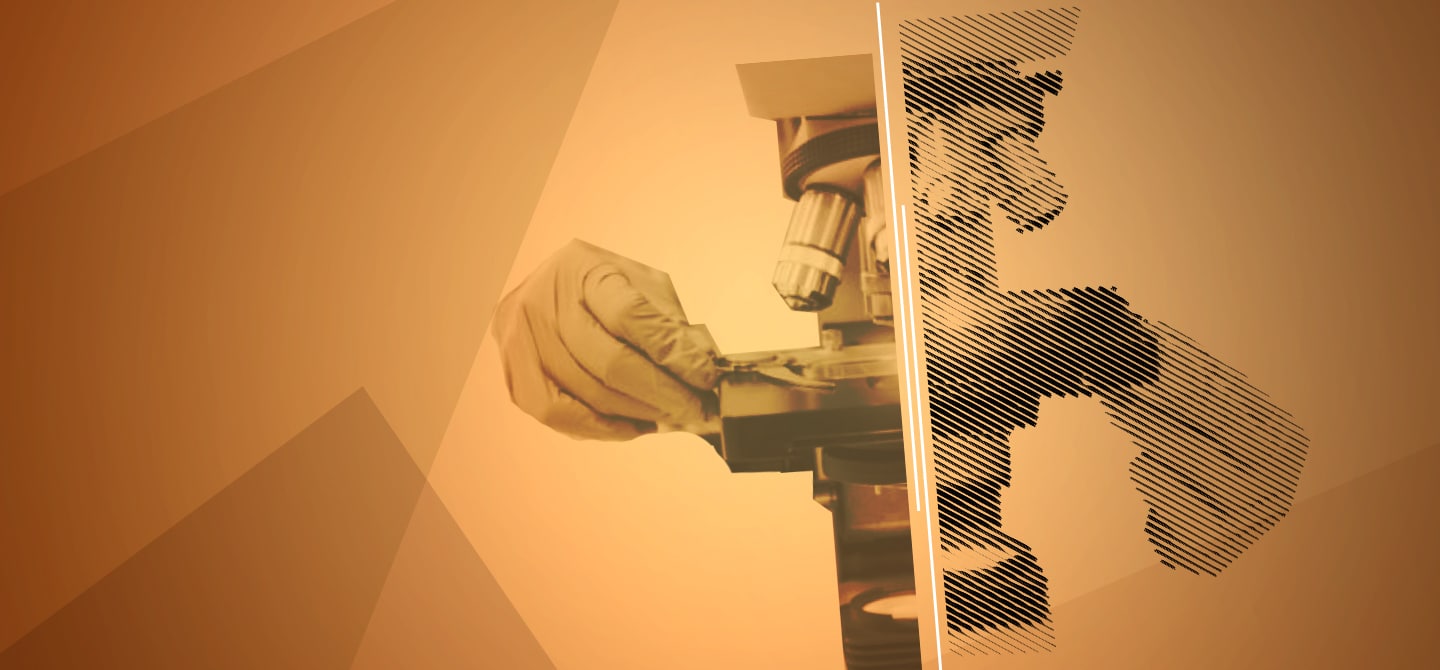This article is the second episode of a two-part survey conducted with Ifop in August 2022. Click here to download the results.
More than 50% think that science is underrepresented
When asked about the place currently occupied by science in the major debates in society1, most French people (56%) consider that it is “not given enough space”; while 38% consider that it has neither too much nor too little space. Only 6% of the French consider that science takes up too much space in these debates. In this respect, public opinion on this issue remains absolutely unchanged compared to 2018, i.e. before the pandemic.
However, 82% of French people believe that policymakers should rely more on scientists and independent health agencies to inform their decisions, including 20% who strongly agree with this statement. This score, although high, shows a notable drop of ‑5 points compared to 2018, which perhaps reflects the effects of Covid, where we have seen public authorities adapt their, sometimes-unpopular, decisions according to the opinion of the scientific council.
While more than 7 out of 10 French people consider that political programmes should be based more on scientific studies (75%, with 15% strongly agreeing with this statement), only 33% consider that current political programmes are based on scientific studies and 39% consider that science is sufficiently present in public debate.
This disparity between the attitude of the French public and the reality of current political action in relation to science is countered by a strong concern about the instrumentalisation of science in the public debate. 73% of the French public agree with the idea that “science is being instrumentalised in the public debate”, including 14% who are completely convinced of this.
More specifically, 25–34-year-olds and employees below management level are once again disproportionately represented (78% and 81% respectively), as are 50–64-year-olds (84%). Here again, the health crisis and the political decisions, which are sometimes considered authoritarian regarding travel restrictions, the obligation to wear a mask, compulsory vaccination, etc., in an attempt to curb the epidemic, may have contributed to this statement.
40% think that science brings more good than harm to humanity
For the French, the contributions of science are undeniable, although there is a significant mistrust of the related issue of technical progress.
Generally speaking, 40% of the French feel that science brings more good than harm to humanity, and 45% consider that it brings as much good as harm. On the other hand, 15% feel that science brings more harm than good, and this proportion has increased significantly since the 1980s (4% in 1989 and 6% in 1982). While there are few differences between certain categories of the population in terms of the perception that science brings “more harm than good”, there are several cleavages among those who feel that it brings “more good”: men (46%), residents of Île-de-France (47%), higher education graduates (63%), supporters of the left (49%), LREM (La République en Marche!)(54%) or LR (Les Républicains)(65%) are more likely to recognise the beneficial contribution of science to humanity, While women (35%), people living in the provinces (39%), non-graduates (29%), RN supporters (35%) and those with no party affiliation (28%) are under-represented.
In addition to the fear of the instrumentalisation of science referred to above, the French show a certain mistrust of technical progress, which they strongly associate with science: 86% state that the purpose of science is to enable technical progress.
This distrust is in line with the distrust of public authorities – and therefore with the idea of the instrumentalisation of science – insofar as 6 out of 10 French people say that technical progress serves above all to increase the power of those who govern. This score is up by 17 points in comparison with 1989.
The association between technical progress and unemployment also remains high among the French even though it is lower compared to 1989 and the start of deindustrialisation: 55% consider that technical progress increases unemployment, compared to 77% in 1989, i.e. 22 points less. Here again, women, who are more affected by unemployment and have greater job insecurity, are disproportionately represented (59% compared to 49% of men). Conversely, another majority of French people (53%) consider that in the long-term technical progress creates more jobs than it eliminates (+8 points compared to 1989), and this idea is more strongly defended by men (61% compared to 45% of women) and by people living in the Île-de-France region (63% compared to 50% of people living in the provinces).
Divided opinions on the harmful nature of technology
The French trust science when it comes to proving the harmful effects of a product or technology, but the opposite is not always true.
Indeed, GM crops receive the lowest approval rating (19%, of which only 3% are completely in favour) and are also perceived as products whose harmfulness has been scientifically proven by a relative majority of French people (44%), with only 8% mentioning scientifically proven benefits, 4% who believe that there is no scientifically proven risk, 21% who believe that neither the harmfulness nor the benefits have been scientifically proven, and the remaining 23% who have no opinion.
Next comes 5G, for which opinions are divided in terms of use: a slight majority (58%) are in favour, while 42% are against, including 13% who are totally against. Opinions on its harmfulness are also divided: 19% consider it scientifically proven, compared with 16% who consider that its benefits or lack of harmfulness are scientifically proven, while the majority of respondents either consider that neither is proven (34%) or do not know (31%).
Nuclear energy has a relatively high acceptance rate (64%), even though 31% consider that it is scientifically proven to be harmful. However, here the principle of necessity seems to be at work. Thus, while only 8% defend the idea that the absence of risk is scientifically proven, 19% mention scientifically proven benefits (probably the use of a decarbonised energy). However, 19% consider that neither is proven and 23% do not know.
Finally, the Covid-19 vaccine and homeopathy have very high acceptance rates (63% and 83% respectively, of which 28% and 34% are very favourable) and this should be seen in the light of a benefit/risk balance in favour of scientifically proven benefits.
Nuclear energy has a relatively high acceptance rate (64%), even though 31% consider that it is scientifically proven to be harmful. However, here the principle of necessity seems to be at work. Thus, while only 8% defend the idea that the absence of risk is scientifically proven, 19% mention scientifically proven benefits (probably the use of a decarbonised energy). However, 19% consider that neither is proven and 23% do not know.
Finally, the Covid-19 vaccine and homeopathy have very high acceptance rates (63% and 83% respectively, of which 28% and 34% are very favourable) and this should be seen in the light of a benefit/risk balance in favour of scientifically proven benefits.
These factors tend to prove that the French have confidence in science when it comes to proving the harmfulness of a product or technology. But in the absence of a strong consensus, their attitude differs, depending on their socioeconomic status and level of knowledge, but also, and primarily, according to gender. Indeed, women are largely disproportionately represented among those who are in favour of using homeopathy (+6 points compared to men and +12 points among those who are very much in favour of its use), while they are less numerous to declare themselves in favour of the use of nuclear power (-17 points compared to men), vaccines (-18 points) or 5G (-16 points).
Two thirds believe that innovation should slow down in the face of global warming
As both the source of the problem and the vector of the solution, science in the 21st century must address the major challenge of the climate.
As we have seen, the French have great confidence in science, and this is reflected in the environmental field by the widely shared belief that scientific studies make it possible to correctly assess the impact of human activity on climate change (81% agree with this proposition, including 18% who strongly agree). They therefore believe that science can accurately measure the extent of the problem.
However, 84% also share the view that “science has no right to do certain things because it would alter nature too much”, thus sharing the Rabelaisian adage “science without conscience is but the ruin of the soul”. This opinion – with which 28% completely agree – is up by 2 points compared to 1989, and is mainly held by left-wing sympathisers (90%), who are more sensitive to climate issues, and by the most highly educated (86%). In this way, the French place a limit on science, very probably in connection with their environmental concerns. It is therefore not surprising that after the scorching summer of 2022, marked by heat waves, fires, and violent storms, and marked by the aforementioned mistrust of technical progress, two out of three French people (65%) say that humanity will only overcome global warming if it slows down the pace of innovation and moves towards sobriety and “soft” or “low tech” technologies.
In contrast, only one third of French people (35%) are convinced that technical progress will make it possible to overcome global warming while preserving the current economic system and the quest for growth.
Generally speaking, the supporters of sobriety include several types of profile: on the one hand, women (73% vs. 57% of men) who, as we have seen, are more critical of science and technical progress, and overall, French people with a poor image of science (71%), but also left-wing sympathisers (70%) and in particular EELV (“Europe Ecologie Les Verts” – The Green Party) (75%).








